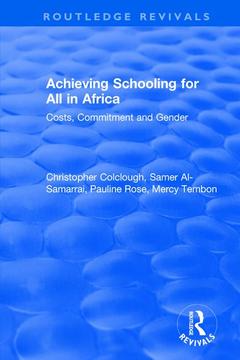Description
Achieving Schooling for All in Africa
Costs, Commitment and Gender
Routledge Revivals Series
Authors: Colclough Christopher, Al-Samarrai Samer, Tembon Mercy
Language: English
Subjects for Achieving Schooling for All in Africa:
Keywords
Primary Enrolments; Millenium Development Goals; Pupil Teacher Ratios; Gender; Education System; Schooling; SSA Country; Africa; Primary Unit Costs; Samer Al-Samarrai; GER; Pauline Rose; Higher Pupil Teacher Ratios; Mercy Tembon; Enrolment Ratio; PPP Term; Primary Enrolment Ratios; Female Enrolment Ratios; Enrolment Outcomes; Gender Gap; HIPC Initiative; Average Teacher Salaries; Average Pupil Teacher Ratio; Household Education Expenditure; Sector Wide Approaches; Teacher Costs; Low Pupil Teacher Ratio; Colonial Administration; Country’s GNP; IDA Lending; Educational Aid; Total Bilateral Aid
142.05 €
In Print (Delivery period: 14 days).
Add to cartPublication date: 06-2017
· 15.6x23.4 cm · Hardback
31.44 €
In Print (Delivery period: 14 days).
Add to cartPublication date: 01-2019
· 15.6x23.4 cm · Paperback
Description
/li>Contents
/li>Biography
/li>




